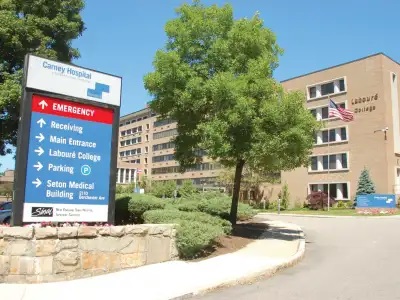Leave none of the Steward hospitals behind
Nashoba Valley, a rural hospital, is on the chopping block
By Amie Shei
AS A BANKRUPTCY COURT in Texas determines the fate of Steward Health Care, two hospitals — Nashoba Valley Medical Center in Ayer and Carney Hospital in Dorchester — have already been cast aside.

The state Department of Public Health has begun holding public hearings as part of the closure process, though no closure plans have been shared publicly.
Mere hours after an emotional hearing for Nashoba Valley Medical Center, Gov. Maura Healey announced that the state would take control of St. Elizabeth’s Medical Center in Brighton through eminent domain to facilitate the transition to a new owner.
This was one of the hospital-saving options mentioned during the Nashoba Valley hearing, a public forum halted only because building access ended, not because everyone who wanted to speak had been heard. Hundreds attended, overflowing from the meeting room into the hallway, some with children in tow, others with walkers in hand.
Many pleaded with the state officials in attendance for more time and financial support so that a qualified bidder could be found. Speakers shared heartfelt stories about the importance of the hospital to their families and to their region and forecasts of dire impacts on the horizon. The mood was sad, angry, somber, and frustrated.
We have been told that the state lacks the means to intervene in the closure of Nashoba Valley Medical Center. If that is true, then the state must summon all of the other tools at its disposal to invest in the health of the community, not just to put a temporary Band-Aid on the situation but to invest deeply, and upstream, to avoid preventable hospitalizations and to ensure the long-term health and well-being of the region.
One such tool is the state’s Advancing Health Equity in Massachusetts initiative, a place-based initiative announced in January aimed at eliminating health disparities. It is notable that Ayer is one of the North Central communities named as a priority geography for focused improvements and investments. The time to begin these focused investments and improvements is now, especially as the state prepares a financing plan that includes cash advances and capital support for the other Steward hospitals that are not being closed.
One of the biggest differences between Nashoba Valley and the other Steward hospitals is that it serves a rural community. It is a tight knit, working class community in the north central region that gets by with little state investment through residents supporting one another.
The shutdown of Nashoba Valley is part of a troubling trend of hospital closures in rural communities across the country. Each time a hospital closes, the health and economic effects ripple across its community for years.
At the hearing, the executive director of the Montachusett Regional Planning Commission emphasized that rural regions in Massachusetts have had a hard time bouncing back from the loss of major industries and that the loss of Nashoba Valley will be no different.
Elsewhere in Massachusetts, we can see these negative impacts when state government fails to intervene to mitigate the losses. At the site of a former community hospital in rural Ware, we have seen a hollowing out of health care services, both literally and figuratively.
Left behind is the empty concrete shell of what used to be a hospital and medical offices. Left behind is a town with just two internal medicine practices. Ware has no pediatricians, no OB/GYNs, no family physicians. If you have a car or can book a microtransit ride, you can find a few options in neighboring towns, but many practices are not seeing new patients or accepting MassHealth.
Such a harsh health care fate should not befall any community in Massachusetts.
The state should not cherry-pick which Steward hospitals and communities it supports and which ones it does not. The strategies, opportunities, and needs will be different in each area, but every community affected by Steward is worthy of transparency, engagement, and investment. There must be a plan for how to support the Nashoba Valley and Carney hospital communities in moving forward.
At the Nashoba Valley hearing, many described the trauma of losing yet another health care service in the region and the feeling of déjà-vu in speaking at yet another closure hearing. Many felt, once again, overlooked, left behind.
Massachusetts is better than this. If we are a true Commonwealth, we must support all communities, especially on their most difficult and rainiest of days. We must leave no community behind.

Amie Shei is the president and chief executive officer of The Health Foundation of Central Massachusetts, a health conversion foundation that celebrates its 25th anniversary this year.
By Amie Shei
Commonwealth News
